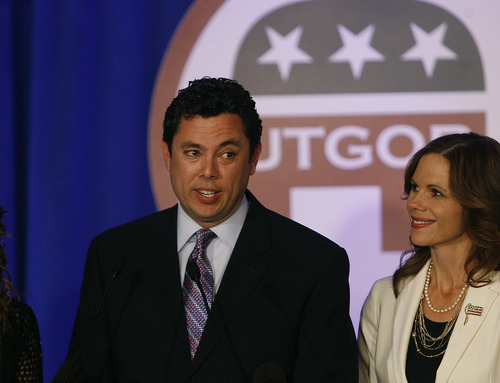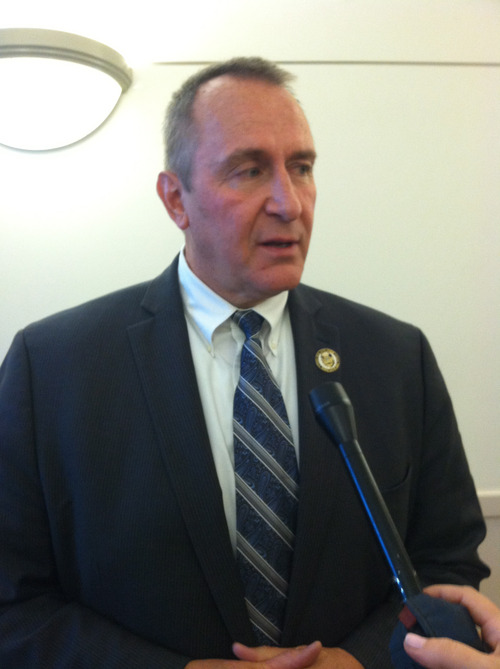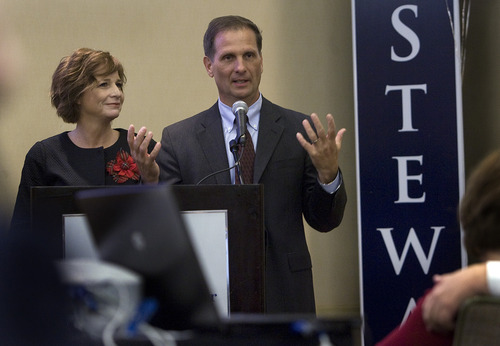This is an archived article that was published on sltrib.com in 2012, and information in the article may be outdated. It is provided only for personal research purposes and may not be reprinted.
As the first states turned red for Republican presidential nominee Mitt Romney, Leo's family turned tense.
The 28-year-old undocumented immigrant said they were eating dinner and started to wonder if their hopes for a President Barack Obama victory were misplaced and that Romney and Republican rhetoric on illegal immigration would win the day — and the next four years.
"I was glued to the TV," he said. "And then he [Obama] finally went over 270 [electoral votes] and we all sort of relaxed."
As a Latino who graduated from the University of Utah with a degree in sociology and who has no current ability to work legally in the United States, he saw the election as a message to both parties to establish some sort of comprehensive immigration reform.
But the message to Republicans was perhaps a bit more urgent.
Obama won the Latino vote by about a 3-to-1 margin, clobbering Romney in states like Nevada and Colorado, and it is forcing Republicans to do some serious soul-searching regarding the issue of immigration.
Republican Utah Attorney General Mark Shurtleff, an outspoken critic of hard-liners on immigration, said a good entry point for the GOP could come as soon as 2013 with Dream Act legislation in Congress.
"That should be done immediately," Shurtleff said. "There will still be a push against it from the extreme right, but that's not where we need to be as a party."
After the election results, it appears the message was received — from some unlikely sources.
—
Changing reality • Media mogul and conservative icon Rupert Murdoch espoused a more moderate approach to immigration after bleak exit polling data for Republicans trickled in. Conservative talk-show host Sean Hannity — long a supporter of tough immigration laws and who once called the Dream Act an "amnesty nightmare" — said this week he had "evolved" on the issue.
"The majority of people here, if some people have criminal records, you can send them home," Hannity said. "But if people are here, law-abiding, participating for years, their kids are born here, you know, first secure the border, pathway to citizenship, done."
According to Pew Hispanic Research, there are about 11 million illegal immigrants in the country. The issue has been a lightning rod, and even measures where there appeared to be broad support — like the Dream Act — failed to clear Congress several times.
The Dream Act even posed problems for Sen. Orrin Hatch, R-Utah.
Hatch was an original co-sponsor of the legislation that would have allowed children brought to the country illegally to attain citizenship by either going to school or serving in the military. But Hatch didn't vote on the legislation when it failed in the Senate two years ago, and he bemoaned the issue had been turned into a political weapon by Democrats.
In the light of Tuesday's results, however, the recently re-elected Hatch seemed open to it — but only after Congress gets past the impending fiscal cliff.
Hatch spokeswoman Heather Barney said immigration is an "issue he cares deeply about," and he "will be returning to Washington to discuss the path forward on immigration reform with his colleagues. This is a tough issue that demands thoughtful policy consideration."
It's also an issue that Republicans recognize they need to grab hold of because the Latino voting bloc is expanding.
According to Latino Decisions, the Latino electorate accounted for 8 percent of the vote in 2004, 9 percent in 2008 and 10 percent this year. The growth is largely in the West, with states like Nevada and Colorado turning blue for the president in 2008 and this year. According to Pew Hispanic Research, 15.1 percent of eligible voters in Nevada are Hispanic and 13.7 percent in Colorado.
Deisi Gonzalez, a 26-year-old Reno resident who became a U.S. citizen this year and voted for the first time, said she was turned off by Republicans touting "self-deportation" and supporting enforcement-only laws like Arizona's SB1070 and Utah's HB497.
She voted for Obama.
"I know Obama has helped Latinos, and I really wanted to keep that going," she said.
—
Pragmatism vs. pandering • U.S. Rep. Jason Chaffetz, R-Utah, cut his teeth on the immigration issue when he was first elected in 2008 — citing a hard-line approach — and who currently has a career grade of "A" with the restrictionist group NumbersUSA.
But this year, he managed to steer a visa reform bill through the House that sought to eliminate caps on certain countries to make it more equitable for people to come into the country. But he was frustrated when the bill stalled in the Senate.
He said the results of the election haven't changed his position on the Dream Act — he opposes it — but he also said he was willing to work on the issue comprehensively in a bipartisan fashion.
He refused to blame Republican policies as the reason for tepid support among Latinos.
"I don't think you skirt away from the rule of law to pander for votes," he said.
Chris Stewart, a Farmington Republican who won his first election to Utah's 2nd Congressional District, said it was important to stop alienating the Latino vote and he supported the general principles of the Dream Act — though he stopped short of a full endorsement until he saw an actual bill.
But the former U.S. Air Force pilot said the GOP needed to take stock of what he believed was a watershed moment for the issue.
"We had a president who was running for re-election in the worst economy in a generation and won," Stewart said. "And when you do that, your party has to look at that and try and discover why. Clearly, some of the arguments we're making aren't resonating with voters."
Alfonso Aguilar, executive director of the Latino Partnership for Conservative Principles, said it was a matter of Republicans tapping into their free-market philosophies.
With the second anniversary of the signing of The Utah Compact Sunday— a document that was mirrored by several states as a set of guiding principles to craft compassionate, comprehensive immigration reform — Aguilar said it was time for Republicans to adopt those ideals.
"There is a growing momentum within the conservative movement to embrace a market-based immigration plan that is in line with [President] Ronald Reagan, who said it best: 'No regulation or law should be allowed if it results in crops rotting in the fields for lack of harvesters,' " Aguilar said. "The influence of the opposition to reform — primarily unions and restrictionists — is slipping because their arguments have fallen flat."
—
Postelection relief • Leo, whose last name was being withheld to protect his identity as he is in the country illegally, said he was so worried about a Romney presidency he waited until after the election to apply for Obama's deferred action policy.
That directive issued by the president earlier this year allows those between the ages of 15 and 30 to apply for a renewable two-year work permit provided they don't have a criminal record and attended school.
He said he's awaiting the processing of the application — a wait that is taking an average of three months.
"It's a step in the right direction," he said. "It's not the whole deal, but I'm more optimistic now than I was before Tuesday."
Twitter: @davemontero









